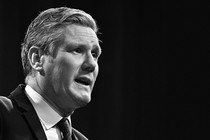Biden Has Fallen Into a Psychological Trap
4 min read
Every neutral observer regards Joe Biden’s debate performance as a historic debacle. To Joe Biden, it’s simply life repeating itself.
Since childhood, Biden has suffered recurrent episodes of brutal humiliation, when the world has mocked and dismissed him. On each occasion, Biden has stubbornly set out to prove his worth. Persistence became his coping mechanism, his effective antidote to humiliation. Triumph was always just a matter of summoning sufficient grit.
In most ways, this tendency of Biden’s has made for a resilient, healthy psyche. Right now it is his psychological prison, a mental habit that might doom American democracy.
Humiliation—and its transcendence—is Biden’s origin story. Born with a speech impediment, he faced the cruel bullying of peers. Even the nuns who taught him mocked him, so much so that he once left in the middle of class and ran home. (In 2019, he vividly recounted this chapter in his biography to my colleague John Hendrickson.)
In response to the abuse, Biden equipped himself with emotional armor. He acquired a charming persona that made him harder to victimize. And he spent endless hours in pursuit of self-mastery. He stood in front of the mirror, reciting oratory and poetry; he learned the techniques that would allow him to muscle through the moments when his stutter sought to impose itself on his brain.
Indignity, he came to understand, was an omnipresent fact of human existence, one of life’s worst sensations. His father kept experiencing it. He lost his job, and the Biden family’s social status slipped. He moved the family from Scranton, Pennsylvania, to Wilmington, Delaware, in search of work. He took a job repairing boilers, far beneath his previous station.
But his father preached the imperative of ferociously clinging to self-respect at moments of perceived weakness. In another foundational story, his father described a Christmas party hosted by his boss, the owner of a car dealership. The owner hurled a bucket of silver coins onto the dance floor, to watch his employees scramble to collect them. Rather than endure this abuse, his father left the party and quit his job.
A similar pattern has repeated itself in Joe Biden’s political career: He keeps suffering profound embarrassments that would crush the esteem of less resilient people. When he ran for president in the mid-’80s, his campaign crumbled in a plagiarism scandal. Elites in Washington began to roundly describe him as a not terribly smart blowhard. When he ran for president again in 2008, he floundered after he described Barack Obama as “articulate and clean,” a description mocked as racist, and emblematic of his tendency to always say the wrong thing. When it was finally his turn, as the sitting vice president, to be the Democratic nominee, Obama told him to step aside in favor of Hillary Clinton. He was being tossed onto the junk heap of political history, by a supposed friend, without ever winning the prize he coveted.
Biden’s response to these episodes was to rush headlong into the future, to work furiously to prove the doubters wrong. After the plagiarism scandal, he became one of the hardest workers in the Senate, a voracious consumer of briefing books, determined never to look stupid again. After Obama cast him aside, Biden ran for president in 2020, despite all the elites who considered him out of step with the zeitgeist.
In a remarkable number of instances, Biden has succeeded in overcoming his humiliations. His persistence paid off. But the result of this pattern is unease, a worry that he always stands on the brink of another crushing embarrassment. Even after becoming president of the United States, he continued to resent how the media failed to credit his many accomplishments. He hated how aides needed to repair his verbal missteps with embarrassing clarifications. His desire for another term, at least in part, is born of his desire for external validation, according to some of the people who know him best.
Now, in the greatest crisis of his career, he’s falling back on his ingrained instincts, his desperate desire to prove himself. But at the moment, given the stakes, his instincts feel less redemptive than delusional. Rather than bowing to the reality of his humiliation, he is doing everything in his capacity to resist it, even if hardly any sane political analyst shares his faith in his ability to recover—even if there’s no reversing the screamingly obvious biological facts of aging.
If his aides and fellow politicians want to help him back away from this disaster, they need to understand his temperament. When they have conversations with Biden about his future, they must respect his dignity, and acknowledge his extraordinary achievements. But the truth can’t be painted over. A man who will do whatever it takes to escape humiliation needs to understand that suffering the near-term indignity of stepping down will allow him to avoid the long-term indignity of being remembered as one of history’s great fools. To prove the doubters wrong, he needs to summon sufficient grit one last time—and relinquish the nomination.



